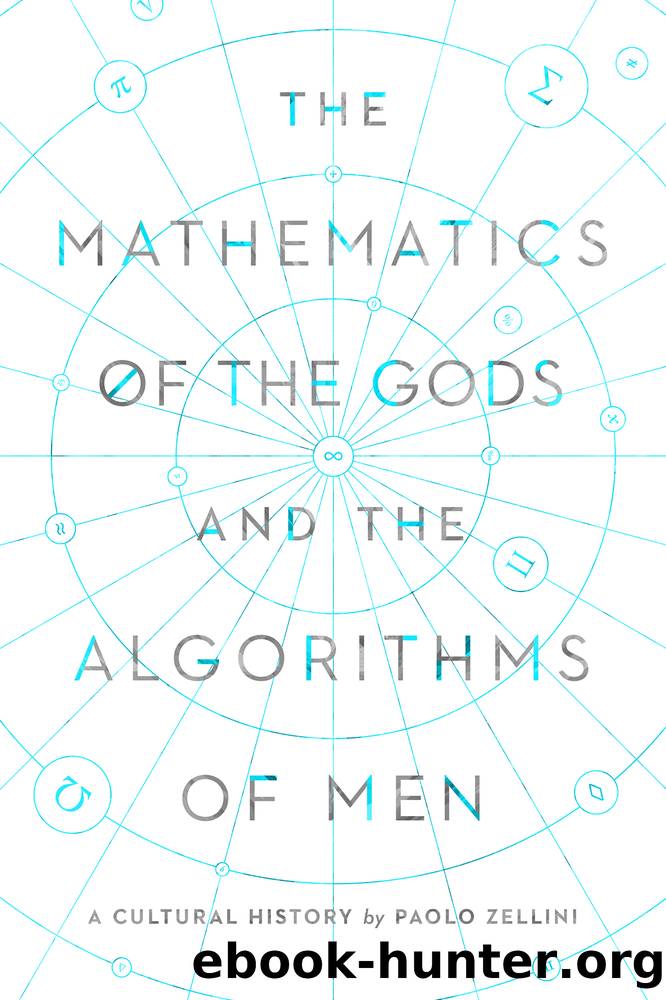The Mathematics of the Gods and the Algorithms of Men by Paolo Zellini

Author:Paolo Zellini
Language: eng
Format: epub
Publisher: Pegasus Books
Published: 2020-05-05T00:00:00+00:00
For Frege, all numbers that were introduced in a logically coherent way were actual. This was a guarantee of reality that the rational and irrational numbers now provided for the continuum and for all the theories of analysis that made it possible to establish that certain mathematical entities, such as the point of intersection between two lines, actually exist in the continuum. This was a position which overturned the whole theory of space-time maintained up to this date, and refuted the most widespread belief among philosophers, at least since Leibniz, that a space made up of points is not logically possible (Russell, Principles, par. 423). A crucial moment in the development of this theory had been Kant’s Critique of Pure Reason, in particular the second antinomy (or coexistence of two contradictory assertions that may both be justified) discussed therein, on the composition of substances. The thesis of the antinomy consisted of the affirmation that ‘every substance that is composed consists of simple parts, and nowhere does there exist anything other than the simple, and that which is composed of it.’8 Russell was able to explain that, thanks to recent arithmetic theories of the continuum, the contrary, antithetical affirmation was no longer sustainable. The argument used against the thesis and against the existence of points, he noted (Principles, par. 435), would show that neither should numbers exist, rational and irrational, that in Cantor and Dedekind were associated with points on a straight line. In the Doctrine of Science (315, 7) of 1837, Bernhard Bolzano had already confronted the question, arguing that the demonstration of the Kantian antithesis, according to which no composite substance consists of simple parts, was completely mistaken. Bolzano conceived of the continuum as an aggregate of simple and indivisible entities, such as points or instants. Taken as a whole, his theory was inadequate: in the absence of a criterion of completeness, the lacunae of the rational corpus remained. Nevertheless, Bolzano anticipated – including in his Paradoxes of the Infinite, published posthumously in 1951 – the numerical atomism that would go on to characterize the more rigorous theories of the arithmetical continuum that appeared towards the end of the century,
Henri Bergson was aware of the demands of a realism that was both practical and philosophical that was implicit in punctiform components of space and time. Bergson had been struck by the realization that lived time, a matter so central to philosophy, had thus far been completely ignored by mathematics.9 Time and space, for mathematicians, were placed on the same level, as if they were things of the same kind, and all that was needed to pass from one to the other was to exchange ‘succession’ for ‘juxtaposition’. Our intelligence, Bergson noted, operates with more ease when it has to deal with points that are in some way fixed: it asks itself where a moving thing finds itself in a certain instant, where it will be in a subsequent instant, and through where it will pass; yet even if it
Download
This site does not store any files on its server. We only index and link to content provided by other sites. Please contact the content providers to delete copyright contents if any and email us, we'll remove relevant links or contents immediately.
| Algebra | Calculus |
| Combinatorics | Discrete Mathematics |
| Finite Mathematics | Fractals |
| Functional Analysis | Group Theory |
| Logic | Number Theory |
| Set Theory |
Modelling of Convective Heat and Mass Transfer in Rotating Flows by Igor V. Shevchuk(6433)
Weapons of Math Destruction by Cathy O'Neil(6266)
Factfulness: Ten Reasons We're Wrong About the World – and Why Things Are Better Than You Think by Hans Rosling(4736)
A Mind For Numbers: How to Excel at Math and Science (Even If You Flunked Algebra) by Barbara Oakley(3302)
Descartes' Error by Antonio Damasio(3271)
Factfulness_Ten Reasons We're Wrong About the World_and Why Things Are Better Than You Think by Hans Rosling(3235)
TCP IP by Todd Lammle(3180)
Fooled by Randomness: The Hidden Role of Chance in Life and in the Markets by Nassim Nicholas Taleb(3108)
Applied Predictive Modeling by Max Kuhn & Kjell Johnson(3065)
The Tyranny of Metrics by Jerry Z. Muller(3065)
The Book of Numbers by Peter Bentley(2964)
The Great Unknown by Marcus du Sautoy(2691)
Once Upon an Algorithm by Martin Erwig(2643)
Easy Algebra Step-by-Step by Sandra Luna McCune(2628)
Lady Luck by Kristen Ashley(2576)
Practical Guide To Principal Component Methods in R (Multivariate Analysis Book 2) by Alboukadel Kassambara(2541)
Police Exams Prep 2018-2019 by Kaplan Test Prep(2540)
All Things Reconsidered by Bill Thompson III(2389)
Linear Time-Invariant Systems, Behaviors and Modules by Ulrich Oberst & Martin Scheicher & Ingrid Scheicher(2364)
